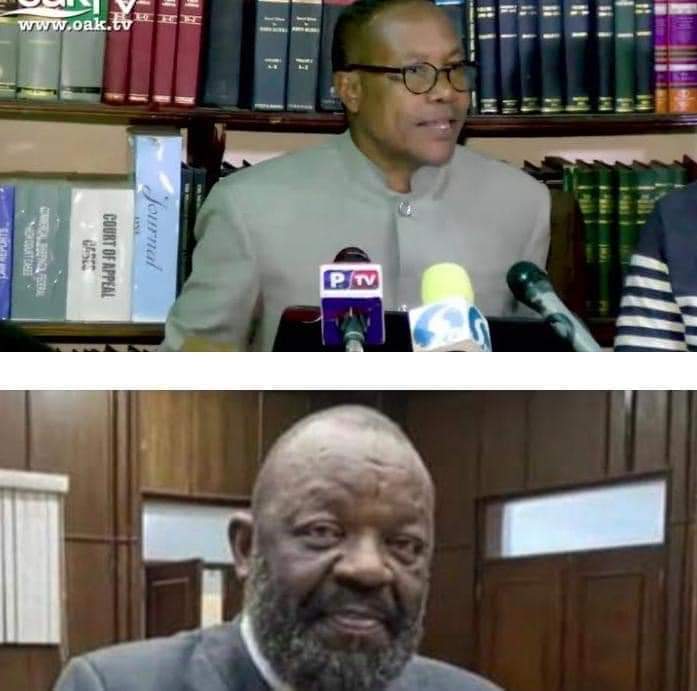
Kanu: ‘Urgent Implementation Of UN Order’, SAN Warns FG About Non-Compliance
Chukwuma-Machukwu Ume, SAN, one of the lawyers of Nnamdi Kanu, leader of the Indigenous People of Biafra, weekend, warned the federal government on the consequences of non-compliance with ‘the-immediate-release-of-Kanu-order’ by the UN Working Group on Arbitrary Detention. The group gave the order in April during its 93rd session.
Ume, in the letter, entitled ‘Urgent Implementation of the UN Universally Accepted Opinion’, made available to our correspondent by Barr Aloy Ejimakor, Kanu/IPOB’s special counsel, enumerated the implications of still-keeping Kanu in custody. The letter was addressed to the AGF and the foreign affairs minister.
Ume said, “By placing Mr Kanu in solitary confinement, the FG subjected him to torture in violation of the Convention Against Torture. Such violation makes Mr Kanu’s detention arbitrary under article 9 of the Universal Declaration of Human Rights and article 9 (1) of the Covenant.”
One of the charges which Kanu faces is jumping bail in 2017. An Umuahia High Court however acquitted him in a suit instituted by Barr Ejimakor.
Ume in the letter clarified that, “The FG arrested Mr Kanu on terrorism-related offences in 2015, and attempted to assassinate him on 10 September 2017 in an army-led attack that killed five individuals and wounded 30 others.
“On 21 September, 2017 the FG reportedly listed the Indigenous People of Biafra as a terrorist organization during ex-parte proceedings lacking elements of due process.
“In Resolution 12/16, the Human Right Council called on states to refrain from imposing restrictions which are not consistent with article 9 (3), including expression of opinion and dissent.”
Kanu was arrested in Kenya and brought to Nigeria last year, which legal luminaries argue violated international laws.
Ume stated in the letter that, “Following his rendition to Nigeria, Mr Kanu was detained in solitary confinement. Mr Kanu’s life is in jeopardy and that he suffers from medical condition occasioned by gradual depletion of potassium in his system.”
Ume reminded the FG that the procedure followed in the rendition of Kanu did not follow due processes. Quoting him, “The Working Group finds that the fair right and procedural guarantees of Mr Kanu were not observed and that such violations render Mr Kanu’s arbitrary under category III.
“The Working Group finds that Mr Kanu has indeed been targeted by the government as a human rights defender.”
The group in the letter claimed that Kanu has been denied medical treatment for his heart condition, adding that, ‘prolonged solitary confinement in excess of 15 consecutive days is prohibited under rules 43(1)(b) and 44 of the Mandela Rules’.
Ume advised that, “The appropriate remedy would be to release Mr Kanu immediately and for both Kenyan and Nigerian governments to compensate him.”
Ume warned that the Working Group would refer Kanu’s present case to the Special Rapporteur on torture and other cruel as ‘inhuman or degrading treatment or punishment’ for appropriate action.
It directed the FG to clarify the above information within six months, adding that ‘the group reserves the right to take its own action in follow-up to the opinion if new concerns in relation to the case are brought to its attention’.
He said the action would enable the Working Group ‘to inform the Human Rights Council of progress made in implementing its recommendations’.
Our correspondent reports that the Working Group, which is an integral part of the United Nations Human Rights Council, is a quasi-judicial body that has the mandate of the UN to adjudicate human rights petitions.
It was gathered that the Opinion of the Working Group ‘is legally binding on Nigeria because it is based primarily on Universal Human Rights standards set by Article 9(1) of the International Covenant on Civil and Political Rights, 1966’, among others.
Ume stated that, “The ratification is a means by which a nation renders itself subject to international laws and treaties. And by virtue of Section 12 of the 1999 Constitution of the Federal Republic of Nigeria {as amended}, the ratification makes Nigeria bound by whatever treaties, principles, protocols, etc that it ratified and domesticated.”
He added that, “That Kenya has not taken up a complaint against Nigeria for kidnapping a British citizen in her sovereign State cannot in law be an alibi for Nigeria as to avoid its Rule of Law obligations.
“Nigeria is subject to Decisions cum Opinions issuing from all the United Nations bodies. Nigeria followed through her claims over Bakassi in the International Court of Justice.”
Copyright © 2024 Radio Biafra Ontario. All Rights Reserved. Powered by Podcast Theme
